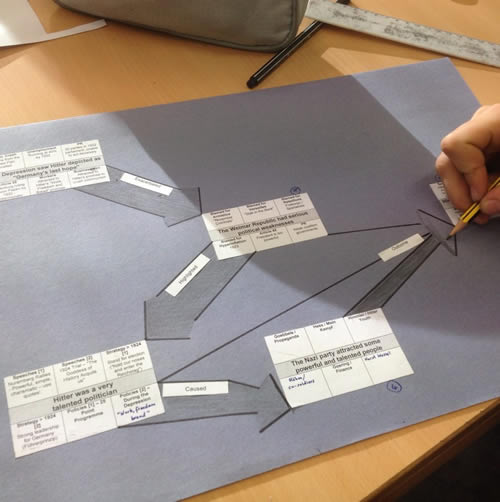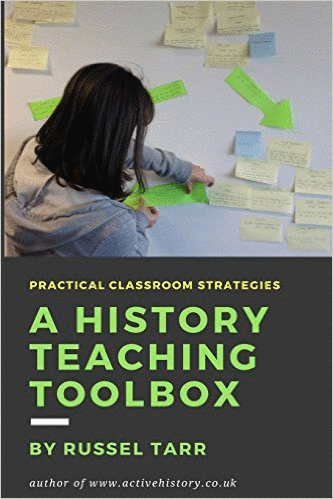Transform your history classroom
ActiveHistory provides educational, award-winning interactive simulations, decision-making games, self-marking quizzes, high-quality worksheets and detailed lesson plans for the school history classroom. All resources have been designed by full-time history teacher Russel Tarr.
An ActiveHistory subscription provides everything you need to construct and deliver a History course from start to finish for the entire 11-18 age range!
These consist not just of lesson plans, worksheets and teacher notes, but also multimedia lectures and interactive games and historical simulations ideal for remote learning and self-study.
World History teaching resources for the high school classroom: lesson plans, worksheets, quizzes and simulation games for KS3, IGCSE, IB and A-Level teachers.

The Weimar Republic and the Rise of Hitler, 1918-33
Note: Full and comprehensive teaching materials for this topic can be found on the ActiveHistory section for this topic.
From the syllabus
Was the Weimar Republic doomed from the start?
How did Germany emerge from defeat at the end of the First World War?
What was the impact of the Treaty of Versailles on the Republic?
To what extent did the Republic recover after 1923?
What were the achievements of the Weimar period?
Why was Hitler able to dominate Germany by 1934?
What did the Nazi Party stand for in the 1920s?
Why did the Nazis have little success before 1930?
Why was Hitler able to become Chancellor by 1933?
How did Hitler consolidate his power in 1933-4?
Specified Content
The Revolution of 1918 and the establishment of the Republic
The Versailles Settlement and German reactions to it
The Weimar Constitution, the main political divisions, the role of the army
Political disorder, 1919-23: - economic crises and hyper-inflation - the occupation of the Ruhr
The Stresemann era
Cultural achievements of the Weimar period
The early years of the Nazi Party: - Nazi ideas and methods - the Munich Putsch - the roles of Hitler and other Nazi leaders
The impact of the Depression on Germany: - political, economic and social crisis of 1930-33 - reasons for the Nazis' rise to power - Hitler takes power - the Reichstag Fire and the election of 1933
Nazi rule in Germany: - the Enabling Act - the Night of the Long Knives - the death of Hindenburg - the removal of opposition
Past Questions
| 2016 Nov (region 3) | 2016 Nov (region 2) | 2016 Nov (region 1) | 2016 June (region 3) | 2016 P1 June (region 2) | 2016 P1 June (region 1) | 2015 Sample paper 1 | ||
| Weimar and Nazi Germany | a [4 marks] | What were concentration camps? |
Describe the Communist threat of 1919-20 to the Weimar Republic. |
What part did Hitler play in the German Workers' Party (DAP)? |
Describe Hitler's role in the Nazi Party before 1929. | What was the role of the President under the Weimar Constitution? |
What were the disadvantages of proportional representation for Weimar Germany? |
What were the main features of the Weimar Constitution? |
| b [6 marks] | Why did Kristallnacht (Night of Broken Glass) occur? |
Why was the Republic able to recover and prosper after 1923? |
Why was Goebbels important in Hitler's rise to power? | Why did the popularity of the Nazi Party increase between 1929 and 1932? | Why were the 1920s a period of cultural achievement for Germany? |
Why were the Spartacists a threat to the German Republic? |
Why was the Weimar Republic in danger of collapse in 1919-20? |
|
| c [10 marks] | 'By the end of the 1930s, Hitler's control of Germany was based on oppression.' How far do you agree with this statement? Explain your answer. | 'The weaknesses in the Weimar Constitution were the main reason for the collapse of the Republic.' How far do you agree with this statement? Explain your answer. | 'The Enabling Act was the main reason Hitler was able to consolidate his power in 1933-34.' How far do you agree with this statement? Explain your answer. |
'The Night of the Long Knives was the most important reason Hitler was able to strengthen his control over Germany during 1933 and 1934.' How far do you agree with this statement? Explain your answer. |
How successful had the Weimar Republic been by 1926 in resolving the problems created for Germany by the Treaty of Versailles? Explain your answer. |
To what extent were Weimar governments successful between 1923 and 1929? Explain your answer. |
'The Weimar Republic was a failure.' How far do you agree with this statement? Explain your answer. |
Classroom activities
Weimar Germany Decision-Making Game - Part 1: 1918-21 [Interactive]
A brand new version of the popular decision making game. Each of the 5 key decision points covers a different issue. By working through the activity and completing the worksheet, students will learn about the diplomatic, economic, social and political problems faced by the Republic, and consider how successfully the Republic dealt with them.
Weimar Germany Decision Making Game - Part 2: 1921-29 (complete with follow-up factual test).
This simulation is a great way of introducing or revising the issues surrounding Weimar Germany in the years 1921-29. Each of the 7 key decision points covers a different issue. By working through the activity and completing the worksheet, students will learn about the diplomatic, economic, social and political problems faced by the Republic, and consider how successfully the Republic dealt with them. The game is designed to "run itself" with minimal teacher preparation. After completing the game, students should be given this factual test, the answers for which can be obtained using this online presentation.
Interactive cartoon analysis
Analyse a series of cartoons by hovering over details and answering exam-style questions. When you have finished, the computer will provide you with a printout comparing your answer to a model answer. A great way to revise and develop sourcework skills.
SOLO Hexagons: The Rise of Hitler
40+ factors are provided to students to organise into meaningful and connected categories as part of the essay-planning process. Full details of the hexagons approach can be found at Tarr's Toolbox.
Interactive Revision Quizzes and Resources
Fling the Teacher Quiz

Ideal for a starter activity. Outline the main task for the day at the beginning of the lesson. Then, give students 10 minutes to play the game. Anyone finishing within the 10 minutes should get points reflecting the amount of minutes left on the clock, then move directly on to the main task for the lesson whilst the rest of the class continue to play.
Repeat this format for ALL your revision lessons to create a "Revision Leaderboard" with a prize given to the overall high score at the end of revision time.
"Who Am I?" Challenge - Weimar Germany
Each team will be presented with a clue about a key historical figure. They get 50 points if they guess it correctly. If they wish to 'pass', they get further (easier) clues but the points available steadily decline. An incorrect guess at any point means they get zero points for that round. You can play as many rounds as you wish. It's a great way to revise!
Telescopic Topic: The Weimar Republic
A collapsible online revision list covering all the main aspects of the topic. A great revision tool.
IGCSE Revision: Homepage

© 1998-2025 Russel Tarr, ActiveHistory.co.uk Limited (Reg. 6111680)
1 Torrin Drive, Shrewsbury, Shropshire, SY3 6AW, England
Privacy Policy | Contact






